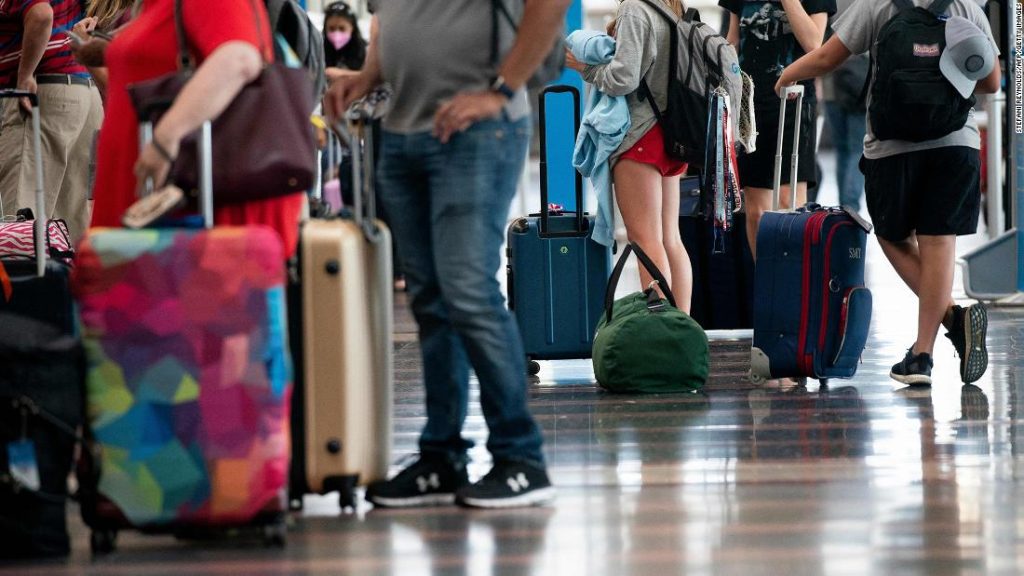
Tracking service FlightAware showed about 2,000 flights being canceled to, from or within the US between Thursday and Sunday, or 2% of scheduled flights. There was a peak of 657 canceled flights on Saturday.
Bad weather played a role again, but staff shortages across the airline industry have also exacerbated the problem. Airlines don’t have the staff, especially among pilots, to adapt when bad weather causes delays.
But the good news is that FlightAware data on Monday afternoon showed 219 flights canceled, less than 1% of the daily schedule.
This is the third weekend in a row that has seen a sharp rise in canceled flights as airlines struggle to deal with demand for flights with limited crews. About 3% of scheduled flights are canceled as of Friday despite Memorial Day weekend, and about 4% of flights are canceled during the Thursday to Monday period around Father’s Day and the 19th weekend.
Back in 2019, before the pandemic, canceled flights didn’t top 1% of the schedule, even during weekends. And when bad weather caused a spike in canceled flights, as happened on Saturday, July 6 of that year, operations returned to normal more quickly.
But it’s not just the holidays that cause problems. Cancellations over the July 4 weekend were lower than the previous week, when daily cancellations ranged from 2.5% to 3.6% of schedule.
Kathleen Bang, a former airline pilot now with FlightAware, said cancellations are becoming the norm due to the employment situation.
“Weather has always affected aviation, but the weather so far this summer has been no worse than usual,” she said. “When we see severe weather, it takes longer for airlines to contend and recover. They don’t have a lot of pilot seats to call in. It seems to be a system-wide staffing issue, turning to the FAA in terms of the air traffic control system.”
Airlines are not doing enough to hire the extra staff they need, said Sarah Nelson, the international president of the Flight Attendants Association, From frontline workers like pilots, mechanics, and flight attendants to the support team, including those who handle scheduling.
“The crew is waiting an hour, two, three, four hours to call the crew scheduler,” Nelson told CNN’s Kristen Romans on Monday. She said that meant some crew members had reached the end of the hours they were allowed to work without being put on another flight.
“We are very disappointed with the airlines regarding back-end operational support during this time as well,” she said.
But she said some problems with delays and flight cancellations were inevitable.
“I want to remind people, it’s not always the airlines’ fault. So, a little sympathy for the people on the front lines. We’ll get you there safely,” she said.
Cancellation issues aren’t limited to US flights. FlightAware data showed that nearly 1,800 flights were canceled around the world on Sunday alone, with more than 1,400 flights taking place outside the United States.
Switzerland-based easyJet announced on Monday that Peter Bello has resigned as COO of the discount company, following flight cancellations, staff shortages and strikes.
But the problems are getting more attention in the United States, especially since American airlines have received $54 billion in federal aid to help them cope with the drop in traffic during the pandemic. The money was used to keep staff in place so that they would have enough workers once air traffic returned. But nearly all airlines have used voluntary takeovers and early retirement packages to cut staff during the downturn, resulting in staff shortages.
Senator Bernie Sanders has noted that the government assists airlines when calling on the Department of Transportation to impose heavy fines when flights are delayed or canceled — demanding $55,000 in fines per passenger if airlines cancel flights they know cannot be fully staffed.




More Stories
JPMorgan expects the Fed to cut its benchmark interest rate by 100 basis points this year
Shares of AI chip giant Nvidia fall despite record $30 billion in sales
Nasdaq falls as investors await Nvidia earnings